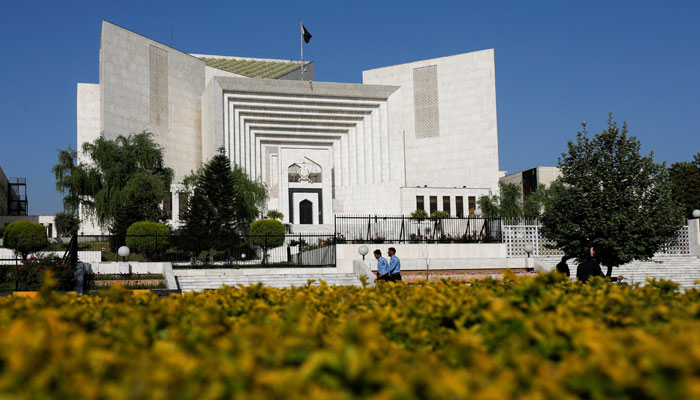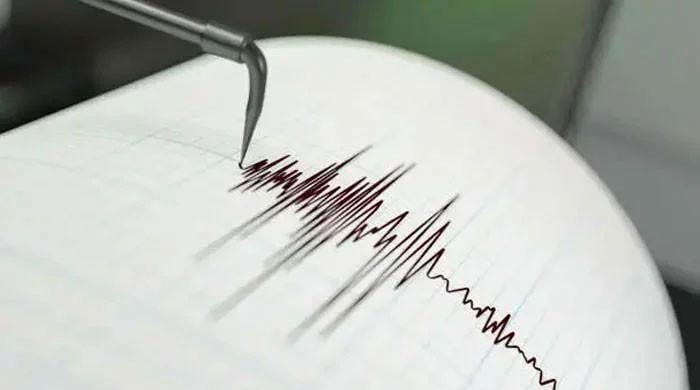Cipher case: SC issues notices to federation, interior ministry on Imran Khan’s bail plea
Apex court adjourns hearing for an indefinite period after issuing notices
November 22, 2023

- Apex court adjourns hearing for indefinite period.
- Also adjourns hearing on plea challenging indictment in cipher case.
- IHC, a day earlier, had nullified notification on jail trial.
ISLAMABAD: The Supreme Court on Wednesday issued notices to the federation and the interior ministry on Pakistan Tehreek-e-Insaf (PTI) Chairman Imran Khan’s bail plea in the cipher case.
The petition was heard by a three-member bench comprising Justice Sardar Tariq Masood Justice Yahya Afridi and Justice Ayesha Malik.
At the outset, the bench asked when the issue came up and the punishment it carries if a person is found guilty.
Barrister Salman Safdar, Khan's counsel, then briefed the court on the inquiry report and accusations made against the former prime minister in the case.
He added that Khan’s then-principal secretary Azam Khan also accused the PTI chief of misusing the cipher.
Justice Masood then inquired whether the role of co-accused was determined in the case.
The lawyer stated that Asad Umar had been released while Azam Khan from being an accused was turned into a witness for the case.
On this, Justice Afridi interjected and stated that in the inquiry it was said that the co-accused’s role be determined during the interrogation and asked what was said in the final investigation report by the investigating officer.
Safdar shared that the investigation officer did not did not adopt a clear stance. He added that Azam was “kidnapped” and after the “kidnapping” his statement was recorded under Section 164.
“Look, this is how the truth comes out,” said Justice Masood.
On this, Safdar then contended that his client was being politically victimised.
During the hearing, Justice Malik asked the lawyer what was the central ground of his case.
“Our case is that this case is not maintainable,” responded Safdar. The sections included in the FIR against the PTI chief are those that are included in espionage offences.
“It was never mentioned in the investigation where the spying was done or which enemy country benefited out of it,” said Safdar.
To this, Justice Masood observed that the government was contending the accused compromised the code of the cipher.
Justice Afridi then brought up the issue of the cable's secrecy and whether the PTI chief had shown the document to anyone.
Safdar told the court that the cipher was not shown to anyone during this time.
"If the contents of a document are shared while waving it, doesn't it mean making it public?" asked Justice Masood while referring to the first time when the PTI chief revealed the alleged conspiracy in a rally.
Moving on, Justice Masood told the lawyer that the Islamabad High Court’s (IHC) decision to nullify the trial would benefit the prosecution as the government would now rectify all its mistakes and go for a trial.
“We had a petition related to bail and we have issued notices on it,” said Justice Masood. He added that this is what they could only do.
The apex court then adjourned the hearing for an indefinite period.
Earlier, the same bench also heard the PTI chief‘s petition challenging his indictment in the case and that was also adjourned for an indefinite period. The adjournment was issued after Khan’s lawyer Hamid Khan asked for time to review the IHC on the jail trial.
The IHC, a day earlier, had nullified the notification for conducting Khan's jail trial on charges of leaking state secrets — issued on August 29.
A special court was conducting the trial in jail citing security concerns since Khan was indicted on the charges last month. The PTI chairman is currently in Adiala jail after he was indicted by the special court on October 23.
The ruling came as a division bench comprising Justice Miangul Hassan Aurangzeb and Justice Saman Riffat Imtiaz announced the verdict it reserved earlier in the day on the intra-court appeal filed by the PTI chief against his jail trial.
In August of this year, Khan and his deputy Shah Mahmood Qureshi were booked under the Official Secrets Act 1923 in the cipher case after the Federal Investigation Agency (FIA) invoked Section 5 of the said law.
The diplomatic cable reportedly went missing from Imran's possession. According to the former ruling party, the cable contained a threat from the United States to topple the PTI’s government.
What is ciphergate?
The controversy emerged on March 27, 2022, when Imran Khan — less than a month before his ouster in April 2022 — while addressing a public rally waved a letter before the crowd, claiming that it was a cipher from a foreign nation that had conspired with his political rivals to have PTI government overthrown.
He did not reveal the contents of the letter nor did he mention the name of the nation it came from. But a few days later, he accused the United States of conspiring against him and alleged that Assistant Secretary of State for South and Central Asia Affairs Donald Lu had sought his removal.
The cipher was about former Pakistan ambassador to the US Majeed's meeting with Lu.
The former prime minister, claiming that he was reading contents from the cipher, said that "all will be forgiven for Pakistan if Imran Khan is removed from power".
Then on March 31, the National Security Committee (NSC) took up the matter and decided to issue a "strong demarche" to the US for its "blatant interference in the internal affairs of Pakistan".
Later, after his removal, then-prime minister Shehbaz Sharif convened a meeting of the NSC, which came to the conclusion that it had found no evidence of a foreign conspiracy in the cable.
In the two audio leaks that took the internet by storm and shocked the public after these events, the former prime minister, then-federal minister Asad Umar, and then-principle secretary Azam Khan could allegedly be heard discussing the US cipher and how to use it to their advantage.
On September 30, the federal cabinet took notice of the matter and constituted a committee to probe the contents of the audio leaks.
In October, the cabinet gave the green signal to initiate action against the former prime minister and handed over the case to the FIA.











